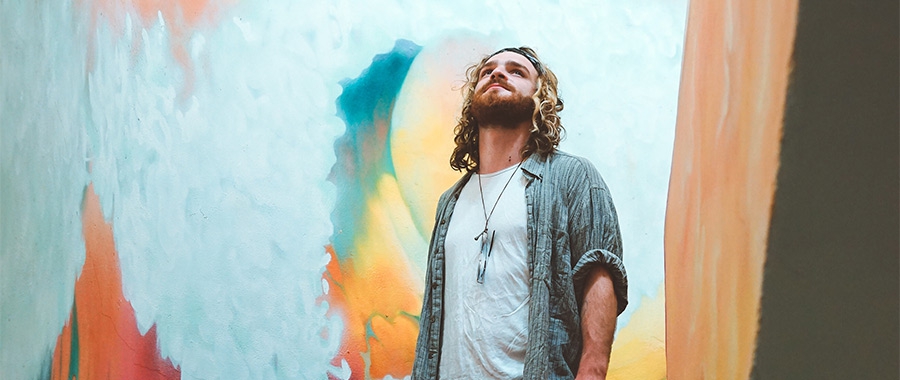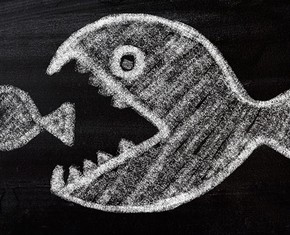The views expressed in our content reflect individual perspectives and do not represent the authoritative views of the Baha'i Faith.
As an artist, I frequently struggle with balancing the forces of my lower and higher natures during the creative process.
Probably every artist has the same struggle, since each person inherently possesses the dual nature we’re all born with:
In man there are two natures; his spiritual or higher nature and his material or lower nature. In one he approaches God, in the other he lives for the world alone. Signs of both these natures are to be found in men. In his material aspect he expresses untruth, cruelty and injustice; all these are the outcome of his lower nature. The attributes of his Divine nature are shown forth in love, mercy, kindness, truth and justice, one and all being expressions of his higher nature. – Abdu’l-Baha, Paris Talks, p. 60.
I want to develop attributes that contribute to my higher nature, but undoubtedly aspects of my lower nature, such as feelings of ego, insecurity and self worth, start to creep in and cloud my judgment—and my creative process. Unfortunately such vulnerabilities are simply conditions of my environment and the creative industry at large, so it’s natural that they make their way into my consciousness, or my subconscious mind. However, I find them to be incredibly limiting when it comes to developing my own creative power of expression.
As artists we each have our own intentions, inspirations and creative processes—that’s what makes us and our art unique! Adopting qualities and placing focus on the attributes that contribute to our spiritual growth and higher nature helps us work through some of those feelings that feed into our lower nature, like ego and doubts about self worth.
So, in the spirit of reflection and growth, I consulted a few of my creative friends to see what attributes, attitudes and approaches they call on to stay focused and contribute to their higher nature in the process of creation. Their consensus? They recommended seven steps that have helped them make art from their spiritual struggles:
1. Prayer and Meditation
Immerse yourselves in the ocean of My words, that ye may unravel its secrets, and discover all the pearls of wisdom that lie hid in its depths. – Baha’u’llah, Gleanings from the Writings of Baha’u’llah, p. 136.
How often do artists hit a wall in the creative process—and how often does that wall lead to other thoughts of doubt and insecurity? It happens to all of us, and my artist friends each said they used prayer and meditation to find their way around that wall.
The Baha’i quotation above reminds me that the practice of prayer and meditation can transport us out of our physical bodies, place us in the ocean of spiritual life and “unravel its secrets.” The Baha’i teachings say this immersion helps us transcend our lower nature, and puts us in touch with the Creator.
I believe this practice holds the key to the creative process, as it unlocks the “doors of mysteries,” ultimately lifting us out of the creative rut and detachment from our egos:
Meditation is the key for opening the doors of mysteries. In that state man abstracts himself; in that state man withdraws himself from all outside objects; in that subjective mood he is immersed in the ocean of spiritual life and can unfold the secrets of things-in-themselves. To illustrate this, think of man as endowed with two kinds of sight; when the power of insight is being used the outward power of vision does not see. This faculty of meditation frees man from the animal nature, discerns the reality of things, puts man in touch with God. This faculty brings forth from the invisible plane the sciences and arts. Through the meditative faculty inventions are made possible, colossal undertakings are carried out; through it governments can run smoothly. Through this faculty man enters into the very kingdom of God. – Abdu’l-Baha, Paris Talks, p. 175.
2. Perseverance
Perseverance is an essential condition. In every project firmness and steadfastness will undoubtedly lead to good results; otherwise it will exist for some days, and then be discontinued. – Abdu’l-Baha, Selections from the Writings of Abdu’l-Baha, p. 144.
All artists and people with creative inclinations have to learn to persevere when times get hard, when things don’t go according to plan, when our prayers have not been instantly answered. The Baha’i teachings remind us that although the road is not always easy, with perseverance our project will ultimately lead to good results, even if plans change course:
Be thou resolute and steadfast. When the tree is firmly rooted it will bear fruit, therefore it is not permitted to be agitated by any test. Be thou not disheartened! Be thou not discouraged! The trials of God are many, but if man remains firm and steadfast the test itself is a stepping stone for the progress of humanity. – Abdu’l-Baha, ’Star of the West,’ XVII:10, US Baha’i News Service, January 1927 pg 329
3. Humility
Humility exalteth man to the heaven of glory and power. – Baha’u’llah, Epistle to the Son of the Wolf, p. 29.
Humility, kindness, resignation, and all these spiritual attributes emanating from great physical strength are acceptable to God. – Abdu’l-Baha, Divine Philosophy, p. 98.
The quotes above remind us that employing a humble attitude during the process of creation is really a means of exaltation. All artists need humility, required when we work in teams or ask our colleagues, friends, family for feedback and guidance. I’ve often presented an idea or concept to someone and been so protective of my work that I was blind to the truth they told me. Had I been more humble, my work could have improved.
In the concluding segment of this two-part article, we’ll look at four more spiritual qualities that can help our higher nature emerge in our art.
















Comments
Sign in or create an account
Continue with Googleor